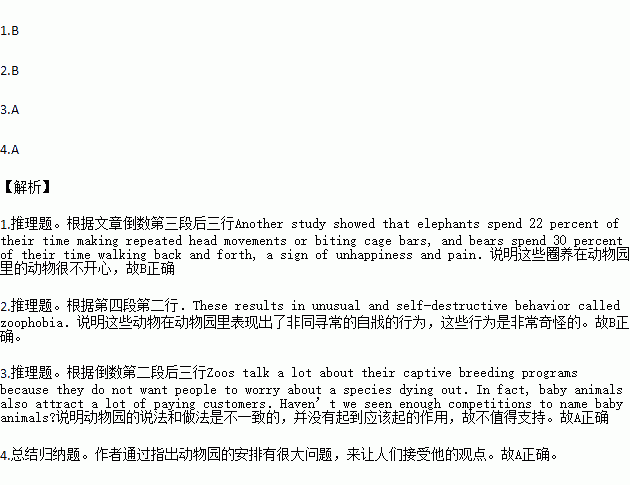题目内容
C
How could we possibly think that keeping animals in cages in unnatural environments -mostly for entertainment purposes - is fair and respectful?
Zoo officials say they are concerned about animals. However, most zoos remain “collections” of interesting “things” rather than protective habitats. Zoos teach people that it is acceptable to keep animals bored, lonely, and far from their natural homes.
Zoos claim to educate people and save endangered species, but visitors leave zoos without having learned anything meaningful about the animals’ natural behavior, intelligence, or beauty. Zoos keep animals in small spaces or cages, and most signs only mention the species’ name, diet, and natural range. The animals’ normal behavior is seldom noticed because zoos don’t usually take care of the animals’ natural needs.
The animals are kept together in small spaces, with no privacy and little opportunity for mental and physical exercise. This results in unusually and self-destructive behavior called zoochosis. A worldwide study of zoos found that zoochosis is common among animals kept in small spaces or cages. Another study showed that elephants spend 22 percent of their time making repeated head movements or biting cage bars, and bears spend 30 percent of their time walking back and forth, a sign of unhappiness and pain.
Furthermore, most animals in zoos are not endangered.Captive breeding(圈养繁殖) of endangered big cats, Asian elephants, and other species has not resulted in their being sent back to the wild.Zoos talk a lot about their captive breeding programs because they do not want people to worry about a species dying out. In fact, baby animals also attract a lot of paying customers. Haven’t we seen enough competitions to name baby animals?
Actually, we will save endangered species only if we save their habitats and put an end to the reasons people kill them. Instead of supporting zoos, we should support groups that work to protect animals’ natural habitats.
1.How would the author describe the animals’ life in zoos?
A.Dangerous. B.Unhappy.
C.Natural. D.Easy.
2.In the state of zoochosis, animals _________.
A.remain in cages
B.behave strangely
C.attack other animals
D.enjoy moving around
3.What does the author try to argue in the passage?
A.Zoos are not worth the public support.
B.Zoos fail in their attempt to save animals.
C.Zoos should treat animals as human beings.
D.Zoos use animals as a means of entertainment.
4.The author tries to persuade readers to accept his argument mainly by _________.
A.pointing out the faults in what zoos do
B.using evidence he has collected at zoos
C.questioning the way animals are protected
D.discussing the advantages of natural habitats

